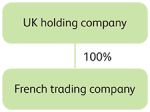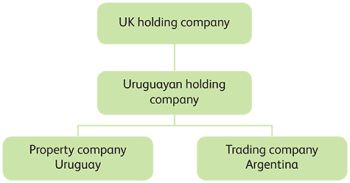This article is the second of a series of articles that looks at tax aspects of the UK company which make it an attractive international business company, or "IBC".
This generic label, and its acronym, are normally associated with the BVI company, and its international competitors. An essential feature of BVI, Bahamian, Cayman and other "offshore" companies is that they pay no corporation tax in their domicile of incorporation. UK companies substantially replicate this characteristic for various types of income, whilst providing the additional benefit of access to over 100 UK double tax treaties, the European Treaty (for the time being) and the high status in which the UK company is perceived.
UK COMPANY RESIDENCE
All UK companies are UK resident for tax purposes under the "incorporation rule". This prima facie results in liability to UK corporation tax on worldwide income and gains, subject to double taxation relief. The current rate of UK corporation tax is 19% (the rate is scheduled to fall to 17% in 2020), however there are important qualifications to liability to UK corporation tax as was shown in the first article dealing with non-UK source dividends received by UK companies, which are generally exempt from UK corporation tax. In this second article, the UK taxation of capital gains realised by UK companies from the sale of "substantial shareholdings" will be considered.
SUBSTANTIAL SHAREHOLDINGS: THE UK CORPORATION TAX EXEMPTION
Since 2002 the UK has had a statutory corporation tax exemption regime for UK companies that realise capital gains from the sale of substantial shareholdings. This will be referred to as the SSE throughout this article.
WHAT IS A SUBSTANTIAL SHAREHOLDING?
For a UK company to hold a substantial shareholding, it must hold not less than 10% of the ordinary share capital of another company for a continuous period of at least 12 months.
In the case of part-disposals that leave the UK company with a sub-10% holding, the remaining shares will need to be sold within a year – under the current legislation. However , draft reforming legislation is in existence which, if enacted , will extend the period in which sub-10% holdings (remaining after a part-disposal) can be sold to a much more generous 5 years.
One of the requirements of the SSE tests that is sometimes overlooked, is the requirement that the shares held by the UK company amount to ordinary share capital. Therefore, when UK holding companies are being set up to own non-UK registered companies, it should not be assumed that what the UK company will be holding is actually ordinary share capital. The concept of ordinary share capital requires the UK company to be entitled to receive from the shares:
- not less than 10% of the profits of the investee company (i.e. the company invested in) available for distribution; and
- not less than 10% of the assets of the investee company available for distribution.
It is therefore always important to ask the question whether the foreign subsidiary of a UK company has a share capital for the purposes of the SSE.
HMRC have issued guidance on this point in the past. Two common foreign entities that have been analysed by HMRC are the Delaware LLC, and the German GmbH. According to HMRC, both may issue "shares" for the purposes of UK taxation, and the SSE in particular, but in the case of any US LLCs, each case needs to be examined on its particular facts, especially by studying closely the terms of the relevant State law, and the LLCs operating agreement.
THE UK HOLDING COMPANY: STATUS CONDITIONS FOR THE SUBSTANTIAL SHAREHOLDER EXEMPTION
A feature of the SSE is that the UK company, in order to qualify for the SSE, must either be:
- a sole trading company; or
- a member of a trading group
The draft reforming legislation referred to earlier in this article will, if enacted, abolish these requirements so that the UK investing company may have any kind of status, whether that is trading or non-trading. This will make the SSE regime much more attractive for UK and international groups.
INVESTEE COMPANY OR COMPANIES: STATUS CONDITIONS FOR THE SUBSTANTIAL SHAREHOLDER EXEMPTION
For a UK company to benefit from the SSE, the investee company must have trading status. Specifically, the investee company must either be a trading company or a holding company of a trading group or trading sub-group. The draft reforming legislation, already referred to in this article, will abolish this requirement if enacted, but only if the UK holding company is itself owned directly or indirectly by sufficient "Qualifying Institutional Investors" (QIIs).
DETERMINING THE TRADING STATUS OF AN INVESTEE COMPANY
Experience shows that the requirement that the investee company demonstrates trading status as a holding company of a trading group or sub-group is relatively easy to determine for small groups, but a much more demanding exercise for larger international groups that own a variety of substantial assets in different jurisdictions using different accounting standards.
EXAMPLE OF THE SSE IN RELATION TO A SMALL INTERNATIONAL GROUP

This is the simplest corporate group possible, but it is nevertheless a group, and commonly encountered.
The UK company is a holding company with no trading activity. The French company is a trading company, providing consulting services in the telecommunications sector in France. Therefore, the group is a trading group, so that both companies meet the necessary trading status requirements of the SSE. The UK company qualifies as a member of a trading group.
The UK company sells the shares of the French company, realises a gain and treats the gain as exempt from UK corporation tax in its accounts filed with HMRC. The UK company will be entitled to SSE relief, provided that:
- It has held the shares throughout a 12-month period beginning not more than 2 years prior to the disposal
- The French company is a trading company. HMRC may require to see copies of the French company's management and statutory accounts for the last 2 or 3 years prior to disposal. It would be very unlikely that such a trading company would have significant non-trading assets to disqualify the UK company from the tax exemption.
- Immediately after the disposal, both the UK company and the French subsidiary company (investee company) maintain their trading status as a member of a trading group and a trading company respectively.
Concerning the SSE condition in 3 above, the following points may be made:
- Immediately after the disposal of the French trading company, the UK company is no longer a member of a trading group. As already mentioned, the trading status condition will fall away if, as is expected, the draft reforming legislation is enacted, with retrospective effect from 1 April 2017. Pending this development, the UK company can rely on a subsidiary exemption rule that enables the UK company to claim SSE relief provided it winds up or dissolves as soon as reasonably practicable (para 3(3)(b)(ii) Schedule 7AC, TCGA 1992).
- Concerning the French trading company, the draft reforming legislation will also not require it to be a trading company immediately after the disposal, provided that the disposal is not to a related party of the UK holding company.
From the above it can be seen the SSE is quite effective for small international groups. However, as the next simplified example shows, for larger multi-national groups, the rules require more careful consideration.
EXAMPLE OF THE APPLICATION OF SSE TO A LARGE MULTI-NATIONAL GROUP

This example shows an international group with trading activity in leather production. The group structure has been considerably simplified, but a large group of this nature might have dozens of group companies in a large number of different countries. This adds complexity to determining the group's overall trading status. HMRC's view is that if more than 20% of the group's assets or liabilities or expenses are of a non-trading nature, this would indicate that the application of SSE relief would not be certain. Whilst HMRC's 80/20 test has been criticised by commentators, the legislation itself is not clear in its definition of trading status. A trading company or group is one that carries on trading activities, whose activities do not include "to a substantial extent activities other than trading activities". What if the Property Company in Uruguay owns large tracts of farmland in that country in order to raise cattle as part of the supply of the traded product? Is the land a trading asset? If the company receives a rental income from tenant farmers that varies according to production levels, would that counter an argument that the land is investment property (a "bad" asset for SSE purposes), and would that question perhaps depend on the degree of management and supervision undertaken by the property company over the tenant farmers? These are not black or white issues. Even if the types of assets are clear, the costs of an accounting analysis that categorises trading and non-trading assets, liabilities and expenses will be significant for a large international group, which makes the SSE more difficult legislation in its current form for large groups of an international nature.
As for the "80/20" rule of thumb published by HMRC, it should be stressed that this is not the law, but HMRC's interpretation of it. It is not a hard and fast rule, and HMRC have stated that they will look at groups in the context of their history of activity, and not take a "snapshot" approach at any particular point in time.
CONCLUSION
In its present form, the substantial shareholder exemption is particularly helpful for small international groups with a clear trading status, although less clear-cut for larger international groups. Two points may be made in conclusion:
- The current SSE regime is attractive for small business such as may be run by an international entrepreneur with a group of 2 or 3 trading companies located in two or more countries. Use of a UK holding company may both consolidate ownership in a tax efficient holding company, and provide a strong international corporate image for customers and suppliers. At the same times, the UK holding company can be very tax-efficient in this sort of scenario when receiving dividends, and capital gains from the sale of substantial shareholdings.
- The current SSE regime produces difficulties for larger international groups, however, it is widely expected that draft legislation in the UK's Finance Bill 2017, which was dropped with a lot of other complex legislation to make way for the General Election, will be re-laid before Parliament for retrospective enactment from 1 April 2017. This would have the effect of relaxing the SSE regime, and attracting larger international corporate groups to the UK.
The content of this article is intended to provide a general guide to the subject matter. Specialist advice should be sought about your specific circumstances.

